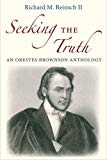Books Reviewed
 restes Brownson (1803-1876) spent 50 years thinking through the tensions between the American experiment and modernity. His voluminous writings display a critical mind, a man of principle willing to question his own principles. Richard Reinsch’s new collection, Seeking the Truth: An Orestes Brownson Anthology, lets readers follow Brownson's evolution from Unitarian utopianism to Catholic constitutionalism.
restes Brownson (1803-1876) spent 50 years thinking through the tensions between the American experiment and modernity. His voluminous writings display a critical mind, a man of principle willing to question his own principles. Richard Reinsch’s new collection, Seeking the Truth: An Orestes Brownson Anthology, lets readers follow Brownson's evolution from Unitarian utopianism to Catholic constitutionalism.
Brownson ended up defending the American constitutional order; republican government; and individual liberty, particularly with respect to religion. His belief that the Declaration of Independence launched a quest that never could or should be completed gave way to doubts that man could ever thrive amidst such an unending democratic revolution. As a young man, he was a devotee of human emancipation and held, with a fanatic's reformist zeal, religious views akin to today’s liberation theology—perfectible humans build heaven on earth. Had Brownson not changed his mind, he would have been a precursor to 20th-century progressivism. Instead, he is a corrective to it, and the emancipationist aspirations of our age.
Reinsch, a Liberty Fund fellow and editor of the LibertyLaw website, organizes the volume to highlight Brownson’s volte-face, which he outlines in a fine introductory essay. The young Brownson advocated emancipation from religious authority, the total separation of church and state, and undercutting religious claims by scientific discoveries. Such reformation served the advancement of man’s empire over nature, including human nature. The “richest gift” God bestowed on man, contended this young Brownson, was the “capacity for Progress.” “Progress” meant human control over fate—our reshaping the world to fit our ever changing, ever growing ambitions and thirst for democratic justice.
No one cringed at the younger Brownson's naive idealism—what Tocqueville called a faith in the “indefinite perfectibility of man”—more than the older Brownson, who converted to Catholicism in 1844. Though his zeal for social reform never wavered, Brownson changed his mind about the modern regime’s ends.
Brownson developed a more nuanced understanding of the nature and conditions for religious freedom, and its relation to modern democracy. The mature Brownson equated religious freedom with “civil tolerance.” Though error, he argued, has no rights before God, the erring and unerring stand as equals before the civil authority. Brownson's position opposed both traditional Catholic teaching, which insisted error had no rights before either God or the civil authority, and modern humanitarians, who doubted man could ever err before God. Within this civil space, thought Brownson, man must be left free to situate himself before God. Liberty of conscience must therefore extend to individuals and churches.
Brownson believed certain elements of the modern regime were inimical to human flourishing. Protestantism's embrace of individualism, modern democracy’s assertion of indefinite human power over the moral and physical world, and consensual government's continual remaking of the civil order all combined to uproot the citizen, leaving him at the mercy of his own fallen nature.
Checking modernity's destructive tendencies required: reverence for restraints of the sort found in America’s Constitution; informal and social checks on government's power; adherence to the inviolable liberty of the human person with respect to belief and property; and an understanding of the ends individual liberty serves. But ultimately, a widespread conversion to traditional Christianity, i.e., Catholicism, was necessary to counter the modernizing revolution.
The checks on modernity are unjustified absent the doctrines of traditional Christianity. Each check points to man’s sinfulness or his thirst for community. The mature Brownson—in what seems a direct rebuke to his earlier self—held that “the mad effort to separate progress from religion…has rendered modern Liberalism everywhere destructive, and everywhere a failure.” Though he retained his understanding of progress and civilization, he became convinced that they were inseparable from religious authority.
Brownson is a most interesting thinker, and a prolix writer. He often uses three well-chosen phrases where one would suffice. Reinsch could not fix that problem, but Seeking the Truth would benefit from an index. Given Brownson's affinities to Tocqueville, it would have been interesting to know if Tocqueville had read the young Brownson before writing Democracy in America, or if the mature Brownson had read Tocqueville. And the exclusion of Brownson’s essays on women—untimely meditations for our advanced humanitarian democracy—is unfortunate.
For all that, Reinsch’s selections are, on the whole, wonderful. One cannot help but sympathize with the task of selecting pieces from a man who edited an eponymous journal. The volume reveals a Brownson who took the Declaration's principles more seriously than Tocqueville. In seeing the Declaration’s fundamental importance, Brownson prefigures the work of Harry Jaffa. But unlike Jaffa, Brownson always sees latent causes of radicalism as sown into the Declaration. For Brownson, the “first wave” of modernity would necessarily give way to the more radical waves. The Declaration, absent a dutiful, religious people, invites an indefinite expansion of human power. Like Tocqueville, Brownson seeks ways to limit that power. Anyone interested in combating the idea that everything is permitted in society's interest would do well to consider Brownson's arguments.


